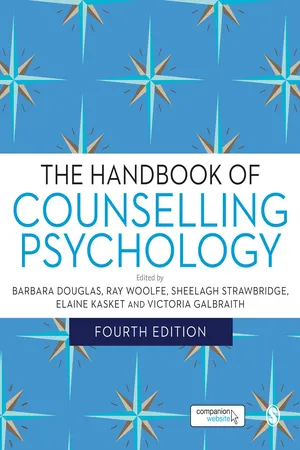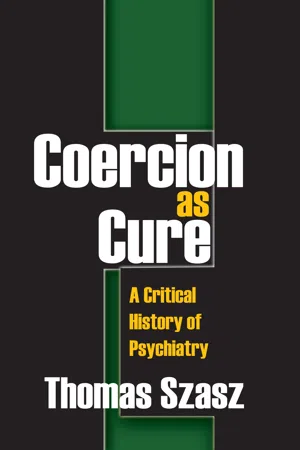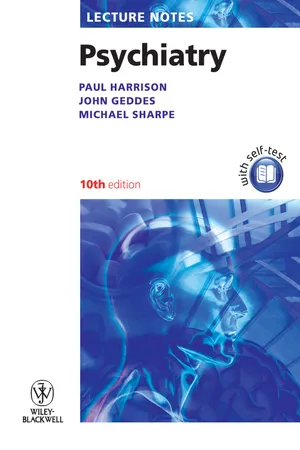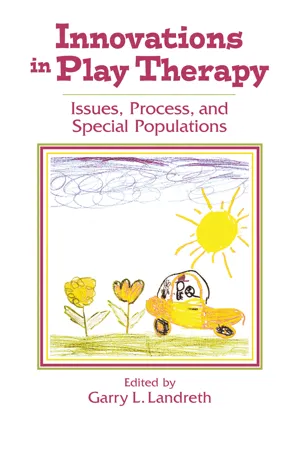Drug Therapy
Drug therapy refers to the use of medications to treat psychological disorders. It involves prescribing drugs that can alter brain chemistry and alleviate symptoms such as anxiety, depression, or psychosis. The goal of drug therapy is to restore balance to neurotransmitters in the brain and improve the individual's overall mental health.
6 Key excerpts on "Drug Therapy"
- eBook - ePub
Foundations of Counseling and Psychotherapy
Evidence-Based Practices for a Diverse Society
- David Sue, Diane M. Sue(Authors)
- 2012(Publication Date)
- Wiley(Publisher)
...Chapter 18 Medications Used with Psychological Disorders In treating depression, the combination of antidepressants and psychotherapy produced the best outcome, although psychotherapy alone for 13 or more sessions was nearly as effective as medication. Medication produces more rapid improvement during earlier sessions, but plateaus without the addition of psychotherapy. (Consumer Reports, 2004) T he use of medication in conjunction with therapy is considered the standard of care for some mental health disorders. As noted in the previous chapter, it has become increasingly important for mental health professionals to have an understanding of basic pharmacology and an awareness of new developments in the field. In this chapter, we present current information and research related to the use of medications with some of the major mental health disorders. For ease of reference, Appendix C contains a listing of information on common psychotropic medications, organized by the disorders treated by each medication. Box 18.1 contains a glossary of pharmacological terms used in this and the previous chapter. The information provided is only a brief introduction, not an exhaustive review of the literature. It is important to remember that the psychopharmacological literature is evolving, and, in some cases, rapidly changing...
- eBook - ePub
- Barbara Douglas, Ray Woolfe, Sheelagh Strawbridge, Elaine Kasket, Victoria Galbraith(Authors)
- 2016(Publication Date)
- SAGE Publications Ltd(Publisher)
...It may not have occurred to the client that medication might affect therapy in any way, that there may be unwanted side-effects, that the medication might not be making any difference, that feeling worse may not be evidence of getting worse but may be due to medication, that all drugs are the same, that all therapy is the same, and so forth. Given the powerful position that medical practitioners hold, it may be difficult for clients to realise that the decision about whether to take medication or not is usually theirs and not the role of the doctor or the therapist. If the doctor is sympathetic and caring, as most probably are, it could seem churlish or ungrateful not to accept the help offered or to question it overtly. Just because a doctor offers drugs does not mean he or she is recommending them. Finally, therapy might seem rather vague or imprecise and the therapist may not be able to state clearly what will happen, how soon the client will feel better and how it works. Beliefs about medication being a scientific treatment and therapy being a bit ‘alternative’ might undermine a client’s willingness to engage in what appears to be ‘only talking’. While it may be wise to consider whether the doctor had enough time in the first consultation to discuss the implications of medication in order for the client to make an informed decision, it may be wise to consider what messages about therapy might have been conveyed either overtly or covertly. As alternatives, or in combination, the choice of medication and/or therapy is not a clear-cut issue and the relationship between them is at best uneasy. Pharmacological approaches Having a clear idea of what drugs are prescribed and for what is the starting point for psychologists who want to begin to build a bridge between pharmacology and psychotherapy. Put simply, most psychotropic drugs alter moods and are either ‘uppers’ or ‘downers’; that is, they are stimulants or sedatives...
- eBook - ePub
Clinical Psychology
A Modern Health Profession
- Wolfgang Linden, Paul L. Hewitt(Authors)
- 2018(Publication Date)
- Routledge(Publisher)
...In fact, the prescription rates for psychopharmaceutic agents have risen greatly over the last few decades (Cavalucci, 2007). Medication can be a blessing for many psychopathological conditions, most notably for psychoses and bipolar disorders where treatment without medication is unthinkable today. In many other instances, psychopharmacological agents compete with psychological treatment (e.g., sleep problems, anxiety, depression, PTSD), and there also are good examples where drugs and psychotherapy can enhance each other’s effects (depression, ADHD). We believe the closing quotation is well placed here because it poignantly describes how most clinical psychologists see themselves and their role when it comes to the treatment of psychopathological conditions: “Pills don’t give skills”. (Anonymous) Some (Sobering) Ongoing Considerations Another important issue for the question of psychological versus drug treatment is simply affordability. Certain drugs no longer have patent protection, and long-term use can therefore be quite inexpensive. On the other hand, the cost of drugs varies extraordinarily even within the same class of treatment like antipsychotic medications where unfortunately the most-easy-to-tolerate antipsychotics also tend to be most expensive. In most Western countries, medications are fully or partly paid for by health insurance companies whereas only a fraction of people, even in rich Western countries, have full third-party coverage for professional psychological services. Therefore, affordability alone sometimes determines the choice of the first-line psychiatric treatment that is offered and received, with psychoactive drugs often winning this decision. We do anticipate that in the long run psychologists and physicians will collaborate in designing clinical treatment paths where pharmacological agents and psychological therapies will work together for maximally cost-effective patient benefit...
- eBook - ePub
Coercion as Cure
A Critical History of Psychiatry
- Frank Villafana(Author)
- 2017(Publication Date)
- Routledge(Publisher)
...7 Psychopharmacology I: Psychiatric Drugs I believe that most mental diseases are molecular diseases, the results of a biochemical abnormality in the human body. I think that the mind is a manifestation of the structure of the brain, that it is an electrical oscillation in the brain supported by the material structure of the brain. —Linus Pauling (1901-1994) 1 * 1 Webster’s defines pharmacology as “the science of drugs” and “the study of the properties and reactions of drugs especially with relation to their therapeutic value.” Psychopharmacology—a branch of pharmacology—is then the science of drugs that act on the psyche or mind. Whether the use of particular drugs is permitted or prohibited by religion or law, or is considered socially proper or improper, are matters that fall outside the scope of psychopharmacology as a science. Such matters belong in the domains of religion, ethics, law, criminology, and politics. Yet, psychopharmacology is political through and through. The term “psychotropic drug” was coined by Ralph Waldo Gerard (1900-1974), an American physiologist, socialist, and scientific front-man for organized psychiatry. In 1955, Gerard and James Grier Miller (1916-2002), founded the Mental Health Research Institute at the University of Michigan. ** The Institute’s goal was to “integrate”—that is, conflate and confuse—biology, medicine, sociology, and politics, in an effort to make the burgeoning psychiatric-therapeutic state appear in the guise of hard science. According to Thomas A. Ban, Gerard used the term “psychotropic drug” to refer to “all drugs with an effect on mental activity and human behavior.” This is not true...
- eBook - ePub
- Paul Harrison, John Geddes, Michael Sharpe(Authors)
- 2011(Publication Date)
- Wiley-Blackwell(Publisher)
...Chapter 7 Treatment Psychiatric treatments may be categorized as biological —drugs and ECT; psychological —the psychotherapies; and social. A combination of approaches is usually used. Sometimes compulsory treatment is given. This is the longest and most ‘fact-packed’ chapter. We suggest you read about a particular treatment as you encounter it in your clinical work. Table 7.1 gives a chronology of the major treatments currently in use. Chapter 8 considers how treatments are delivered and services organized. Evidence-based treatment As in the rest of medicine, there is excellent evidence for some psychiatric treatments and rather less for others. We have tried to use an evidence-based approach to our recommendations—highlighting NICE (National Institute for Health and Clinical Excellence) recommendations where appropriate—and to point out areas where the evidence is lacking and there is clinical uncertainty. Appendix 2 summarizes useful sources of evidence regarding psychiatric treatments. Drug treatments The study of psychiatric drugs—their mechanisms, uses, effects and side-effects—constitutes psychopharmacology. Principles and practice of prescribing Drugs used in psychiatry can be grouped into eight main categories (Table 7.2). Consult a more detailed text for complete information about individual drugs, doses, side-effects, drug interactions and contraindications. Always check the British National Formulary or similar before prescribing any drug with which you are not wholly familiar. Box 7.1 summarizes the important principles that govern the prescription of all psychiatric drugs. Bear these in mind as you read on, and try to put them into practice. Many patients—maybe even the majority—do not take their drugs regularly. This key issue is variously called compliance, adherence or concordance, and the lack of it is a major reason for apparent non-response to medication...
- eBook - ePub
- Garry L. Landreth, Garry L. Landreth(Authors)
- 2013(Publication Date)
- Routledge(Publisher)
...5 What the Play Therapist Needs to Know about Medications Daniel S. Sweeney Ross J. Tatum DOI: 10.4324/9780203768440-5 Historically, psychopharmacology has not been an area of research or concern for the play therapist. A review of the play therapy literature (Landreth, Homeyer, Bratton, & Kale, 1995) revealed an almost absolute dearth of references to play therapy and medication. Many play therapists develop treatment programs with the hope of limiting or eliminating the need for medication, rather than encourage its use. A trend of thought among play therapists appears to be that medications for children are at best probably unnecessary and at worst harmful. With the move toward managed health care and brief therapy in the mental health field, however, insurance companies and third party payment providers are looking for the swift reduction of symptoms that pharmacological approaches might provide. This concept is clearly at odds with the goals of play therapy, which focus upon providing a child with a safe environment in which to process intrapsychic issues in their own language (play). Symptom reduction is a by-product, rather than a focus of treatment, for many child play therapists. The authors have not attempted to address the political issues of managed health care, or the appropriate focus of child mental health treatment. This chapter will, however, address the concern that so many children are on some form of medication and that the play therapist must have some basic knowledge of child psychopharmacology. Additionally, it will address some medication considerations specific to the treatment modality of play therapy. The need for play therapists to be educated about psychopharmacological issues is clear. Phillips and Landreth (1995) conducted a survey of play therapists, and found that seventy-four percent had a master’s degree or below, and that sixty percent had ten years or less of experience in the field...





